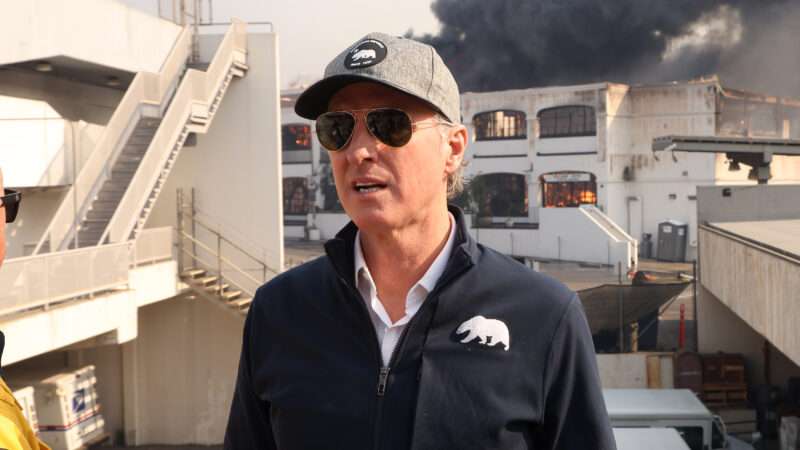If California Can Suspend Permitting Rules After Wildfires, It Can Abolish Them

California Gov. Gavin Newsom has this week issued an executive order to spare victims of the Los Angeles wildfires from onerous government permitting and review requirements as they rebuild their homes and lives. Specifically, he’s putting on hold cumbersome rules required by the California Environmental Quality Act (CEQA) and the Coastal Act.
That’s smart politics and good policy, but why not take this approach further?
“When the fires are extinguished, victims who have lost their homes and businesses must be able to rebuild quickly and without roadblocks,” the governor said in a statement. His order “will help cut permitting delays, an important first step in allowing our communities to recover faster and stronger.” Newsom also “ordered our state agencies to identify additional ways to streamline the rebuilding and recovery process.”
That’s encouraging from a governor who usually loves to regulate, but the decision raises obvious questions. If building regulations are an impediment during an emergency, aren’t they also an impediment during normal times? Since removing these permit and review processes will help communities “recover faster and stronger,” won’t their permanent removal help California deal with, say, its housing shortages and make the supply recovery “faster and stronger”?
Newsom hasn’t suddenly gotten the free-market religion, of course. In a subsequent post, he added, “We are also extending key price gouging protections to help make rebuilding more affordable.” “Price-gouging” – i.e., allowing prices to rise to reflect their scarcity – actually speeds up the rebuilding process as contractors rush to the scene in the hopes of securing lucrative work. The rush of new contractors creates competition and brings prices back to Earth.
Maybe that level of market thinking is too out there for Newsom, but we’ll take progress wherever we can get it. CEQA (signed by Gov. Ronald Reagan in 1970) remains an enormous hindrance to building anything in California, as it allows any “stakeholder” to file a lawsuit challenging the project. It requires voluminous Environmental Impact Reports. Often, project opponents are labor unions seeking higher wages (boost wages and we’ll drop the lawsuit) or neighbors who don’t want extra traffic.
CEQA lawsuits add costs, reduce the size of projects, or even stop new developments. This is widely acknowledged even by the Legislature, yet lawmakers have been loath to take on environmental interests and reform CEQA except on an ad hoc basis.
For instance, in 2013 then-Senate President Pro Tem Darrell Steinberg, D-Sacramento, passed a CEQA exemption to help the NBA’s Kings build a downtown arena. “The bill is similar to other exemptions…lawmakers have granted in years past to facilitate the construction of the San Francisco 49ers’ new stadium in Santa Clara and those offered to a proposed NFL arena in downtown Los Angeles,” the Los Angeles Times reported.
Keeping sports teams in town isn’t the definition of an emergency, but that example shows lawmakers can certainly pare back CEQA’s requirements when they have the proper motivation. Likewise, California legislators have chipped away at CEQA as part of their admirable but insufficient efforts to spark multi-family housing construction by creating a streamlined permitting process. The latest major housing law (Senate Bill 423) even applies exemptions in the Coastal Zone. Newsom signed it over the objections of beachfront preservationists.
In a Marin County lawsuit last year, the state appeals court called CEQA a “formidable tool of obstruction” and declared that “CEQA is not meant to cause paralysis.” But paralysis through analysis is exactly what it does. Meanwhile, the Coastal Act, which was created by Proposition 20 in 1972, gives the California Coastal Commission near-dictatorial powers to approve or deny development as far as five miles inland along the state’s 840-mile coastline.
The commission has long been the state’s ultimate no-growth agency. In 2022 it even killed a proposed desalination project on the site of a decommissioned energy plant at Huntington Beach because of concerns over microscopic plankton. Even a drought didn’t dissuade commissioners from approving that needed water project. The unanimous rejection was the culmination of a years-long regulatory, political, and legal battle.
So, bravo that these devastated Los Angeles area homeowners will be spared the commission’s lengthy administrative process of hearings and edicts. But Newsom surely is aware that Californians routinely struggle with the agency as they attempt even minor upgrades to their properties. Don’t they also deserve some relief?
As an aside, hasn’t Newsom noticed that some COVID-19 regulatory changes have boosted commerce and individual freedom? One of the silver linings of that mess was that officials learned many regulations can be suspended with no ill effects.
For instance, during the pandemic the feds relaxed their prohibitions on telehealth, thus allowing patients to meet with doctors online. The National Institute for Health acknowledges such changes enabled doctors to “reach populations that have low or no access to care.” We also learned that we can dispense with many picayune rules such as bans on direct-to-consumer alcohol sales.
I still find it amazing that after an emergency—whether a pandemic or a particularly destructive wildfire—lawmakers will immediately suspend the same rules and regulations they’ve spent years passing and implementing. Perhaps there’s a broader lesson here.
The post If California Can Suspend Permitting Rules After Wildfires, It Can Abolish Them appeared first on Reason.com.
